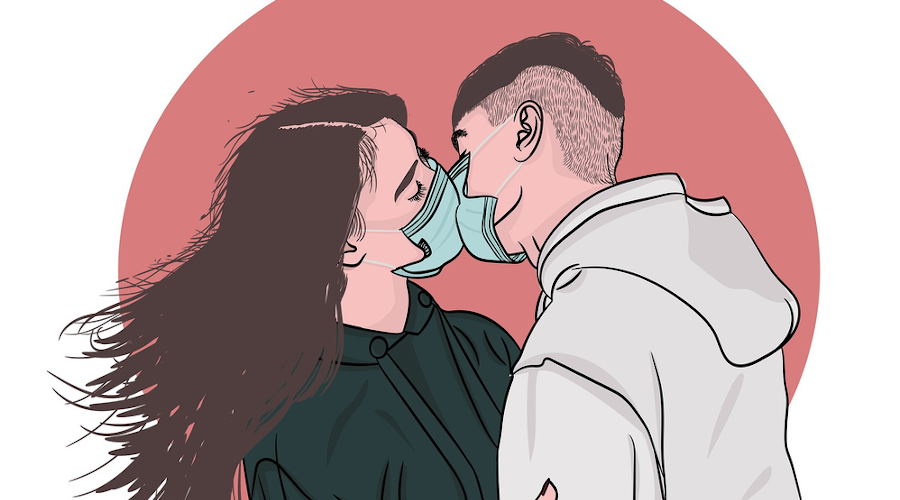One in five couples argue more than before since Corona
This was the result of a representative study by the dating agency Elitepartner, for which almost 2,100 german couples were surveyed in October and November. Among those under 30, arguments are even more common: Almost a third of them reported having argued with their loved ones more often during the pandemic than before. And 11 percent of those in relationships in this age group are currently even considering breaking up—that means almost one in ten young people in Germany is considering breaking up since the coronavirus pandemic.

In light of these findings, two questions arise. First, what is it about the pandemic that poses such great challenges for couples? And second, what is the difference between those couples who are at risk of breaking up under the stress of COVID-19 and those who endure it—or even become stronger as a result?
Corona as a “magnifying glass” for relationships
Psychologist and Elitepartner research director Lisa Fischbach has answers to both of these questions. The pandemic, she explains, has triggered stress in almost everyone, whether caused by fear of infection, reduced working hours, existential anxieties, or high levels of stress at work. If you're in a relationship, you automatically carry this stress into your relationship. It's there, with the person closest to you, that it often erupts—and that often doesn't end well. "The unusually intense and unwillingly chosen closeness to your partner can trigger stress and conflict," says Lisa Fischbach. "Those who manage this through devaluation, withdrawal, or accusations will destroy the relationship in the long run."
The coronavirus is acting like a magnifying glass on relationships. When couples look through it, things suddenly become clearer. "The elimination of distractions in everyday life, hobbies, or leisure activities clears the view for the current state of the relationship quality," explains the psychologist. If this "current state" is positive, then couples benefit: Functional partnerships have gained importance as a result of the lockdown because both partners automatically spend more time together. Such couples enjoy the newly gained time together that they previously spent at the office, with their friends, or at the gym.
Simmering conflicts surface during lockdown
But just as COVID-19 has made many stable relationships even more stable, the virus has also made problematic relationships more problematic. "Couples who were already dissatisfied with their relationship at the beginning of the pandemic, who were less emotionally connected and lacked genuine interest in each other, are becoming aware of this during the lockdown," says Lisa Fischbach. These couples can no longer ignore their problems during the lockdown. They are more likely to break up, says the psychologist.
Simmering, unresolved, ongoing conflicts in relationships usually have a specific cause: The couples suffering from them have very different basic needs. This can mean that one partner wants more independence and the other more closeness; or that two partners have completely different sexual desires. In isolation and during the lockdown, such differences are difficult to ignore—and in many cases have led to heated conflicts.
Certain couples are more prone to doubt
Probably no one likes to admit that they're not compatible with their partner on essential issues. However, acknowledging such problematic differences becomes even more difficult the longer you've been together. "The likelihood of breaking up decreases with the years in a relationship," explains. According to the study, only 12 percent of those who have been in a relationship for more than 20 years argued more frequently during the pandemic; and just three percent of long-term couples have considered breaking up since COVID-19.
Couples who haven't been together that long, on the other hand, are more likely to question their relationship. Couples who have been together between three and five years are, in a sense, at a crossroads. The initial phase of infatuation has faded, and both partners have had plenty of opportunity during the pandemic to consider whether this is the man or woman for the next steps in the relationship—especially with regard to marriage or starting a family. This makes them prone to doubt.
If you've been arguing with your partner more often since the pandemic began, you don't have to immediately assume the worst. It doesn't always have to be due to underlying problems. Instead, forgive yourself for being irritable due to the stress of the coronavirus, and forgive your loved one as well. Neither they nor you have experienced such an exceptional situation before.
And, and this is a truism in couples therapy: Conflicts are inevitable in relationships—whether they harm you as a couple in the long term depends solely on how you deal with them. Those who have resolved conflicts together as a couple, renegotiated needs, or discussed viewpoints can emerge from this difficult phase stronger.




